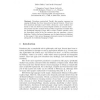Free Online Productivity Tools
i2Speak
i2Symbol
i2OCR
iTex2Img
iWeb2Print
iWeb2Shot
i2Type
iPdf2Split
iPdf2Merge
i2Bopomofo
i2Arabic
i2Style
i2Image
i2PDF
iLatex2Rtf
Sci2ools
WSPI
2004
2004
Self-Referencing Languages Revisited
Paradoxes, particularly Tarski's liar paradox, represent an ongoing challenge that have long attracted special interest. There have been numerous attempts to give either a formal or a more realistic resolution to this area based on natural logical intuition or common sense. The present semantic analysis of the problem components concludes that the traditional language of logic fails to detect Tarski's paradox, since the formalised version of the liar sentence does not represent a correct definition. Neither the formal language, nor the logical system is deficient in this respect. Only natural language statements cannot be interpreted adequately by traditional language of logic.
Related Content
| Added | 31 Oct 2010 |
| Updated | 31 Oct 2010 |
| Type | Conference |
| Year | 2004 |
| Where | WSPI |
| Authors | Gábor Rédey, Attila Neumann |
Comments (0)

